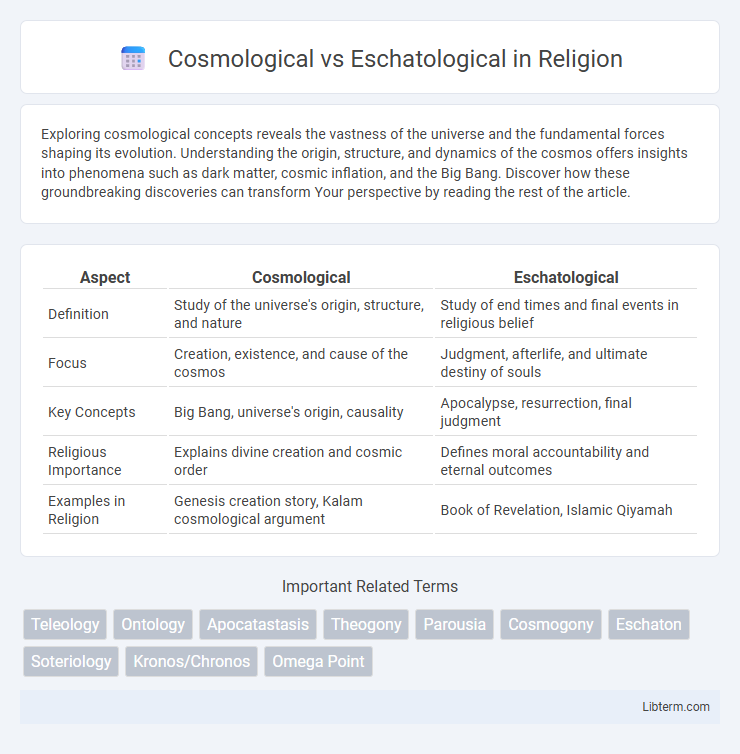Exploring cosmological concepts reveals the vastness of the universe and the fundamental forces shaping its evolution. Understanding the origin, structure, and dynamics of the cosmos offers insights into phenomena such as dark matter, cosmic inflation, and the Big Bang. Discover how these groundbreaking discoveries can transform Your perspective by reading the rest of the article.
Table of Comparison
| Aspect | Cosmological | Eschatological |
|---|---|---|
| Definition | Study of the universe's origin, structure, and nature | Study of end times and final events in religious belief |
| Focus | Creation, existence, and cause of the cosmos | Judgment, afterlife, and ultimate destiny of souls |
| Key Concepts | Big Bang, universe's origin, causality | Apocalypse, resurrection, final judgment |
| Religious Importance | Explains divine creation and cosmic order | Defines moral accountability and eternal outcomes |
| Examples in Religion | Genesis creation story, Kalam cosmological argument | Book of Revelation, Islamic Qiyamah |
Introduction: Defining Cosmological and Eschatological
Cosmological refers to the study and understanding of the universe's origin, structure, and fundamental laws, focusing on the nature and mechanics of the cosmos. Eschatological concerns the ultimate destiny of the universe, life, and humanity, addressing themes like apocalypse, final judgment, and the end times in religious and philosophical contexts. Distinguishing these terms highlights cosmology as the investigation of the universe's beginning and ongoing existence, while eschatology explores its ultimate conclusion and final purpose.
Historical Roots of Cosmological and Eschatological Thought
Cosmological thought originated in ancient civilizations such as Mesopotamia and Greece, where philosophers like Aristotle and Plato explored the universe's structure and origin through myths and rational inquiry. Eschatological concepts emerged prominently in religious traditions, including Judaism, Christianity, and Islam, which developed detailed narratives about the end times and final judgment. Both frameworks shaped human understanding of existence but diverged in focus: cosmology centers on the universe's nature and beginnings, while eschatology addresses ultimate destiny and final events.
Cosmology: Understanding the Origins of the Universe
Cosmology explores the large-scale structure, origin, and evolution of the universe through empirical data and theoretical models such as the Big Bang theory. It integrates observations from cosmic microwave background radiation, galactic formations, and dark matter to explain universal phenomena over billions of years. This scientific discipline contrasts with eschatology, which deals with the ultimate fate and final events of the universe from philosophical or theological perspectives.
Eschatology: Theories of the End Times
Eschatology explores theories of the End Times, examining diverse beliefs about the ultimate destiny of humanity and the cosmos, including apocalyptic, millenarian, and post-apocalyptic scenarios. Key eschatological frameworks include Christian interpretations such as the rapture and final judgement, Islamic views on Qiyamah, and Hindu cycles of cosmic dissolution (Pralaya). These theories often incorporate prophetic texts, metaphysical assumptions, and moral imperatives, shaping cultural and theological understandings of final judgment, resurrection, and eternal fate.
Key Philosophical Differences
Cosmological perspectives examine the origins, structure, and nature of the universe, emphasizing causality and existence through scientific and metaphysical inquiry. Eschatological views concentrate on the ultimate destiny and final events of the world or humanity, often grounded in religious or spiritual doctrines about judgment, salvation, and apocalypse. The key philosophical difference lies in cosmology's analysis of how the universe is and came to be, while eschatology explores the purpose and final outcome of existence.
Major Religious Perspectives on Cosmology and Eschatology
Major religious perspectives on cosmology and eschatology often intertwine creation narratives and end-time visions, shaping believers' understanding of the universe and its ultimate fate. In Christianity, cosmology emphasizes God's creation of the cosmos, while eschatology focuses on the second coming of Christ and the final judgment. Hinduism presents a cyclical cosmology with endless cycles of creation and destruction, paralleling eschatological concepts of cosmic renewal and liberation through moksha.
Scientific Views: Cosmological vs. Eschatological Approaches
Scientific views on cosmological approaches focus on understanding the origins, structure, and evolution of the universe through empirical evidence and theoretical models such as the Big Bang theory and cosmic inflation. Eschatological approaches in science examine the ultimate fate of the universe, including scenarios like heat death, Big Crunch, or Big Rip, based on astrophysical data and entropy principles. Both perspectives utilize astrophysics and cosmology but differ in temporal focus--cosmology studies the universe's past and present, while eschatology explores its potential future.
Influence on Human Culture and Society
Cosmological concepts shape human culture by providing frameworks for understanding the universe's origins, structure, and laws, influencing art, philosophy, and science throughout history. Eschatological beliefs, centered on end times and ultimate destinies, impact social behavior, moral values, and collective hope or fear, often driving rituals, laws, and cultural norms. These two worldviews together mold societal narratives, coping mechanisms, and ethical systems by addressing existence from creation to conclusion.
Contemporary Debates and Developments
Contemporary debates on cosmological and eschatological themes emphasize the intersection of scientific cosmology with philosophical and theological eschatology, exploring the universe's origin and its ultimate fate. Recent developments in quantum cosmology and multiverse theories challenge traditional eschatological views, prompting reevaluation of concepts like the Big Bang, cosmic inflation, and the heat death of the universe. Scholars increasingly analyze how advancements in astrophysics and particle physics influence eschatological narratives, impacting both secular and religious interpretations of cosmic destiny.
Conclusion: Bridging Cosmological and Eschatological Concepts
Bridging cosmological and eschatological concepts reveals a comprehensive understanding of existence that integrates the universe's origin with its ultimate destiny. This synthesis highlights the dynamic interplay between the physical laws governing cosmic evolution and the theological or philosophical interpretations of the final state of being. Emphasizing the convergence of cosmology's empirical evidence and eschatology's metaphysical narratives provides a holistic framework for exploring humanity's place in the cosmos.
Cosmological Infographic

 libterm.com
libterm.com